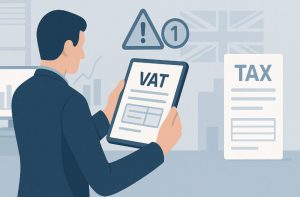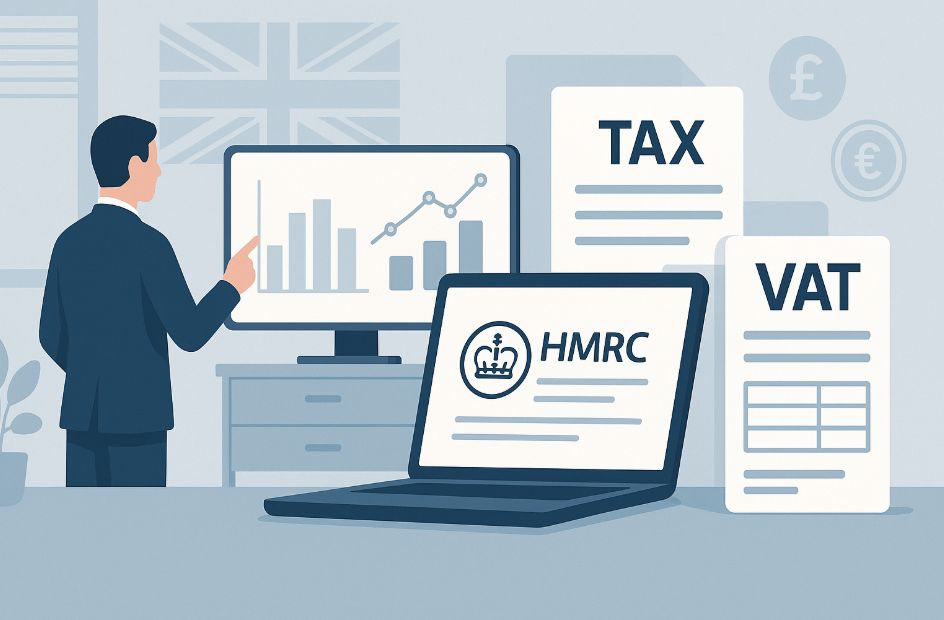As the UK’s tax landscape evolves, 2025 marks a significant turning point for businesses navigating Value Added Tax (VAT) obligations. HMRC’s VAT penalty points system, introduced to improve compliance and replace the previous surcharge model, is now fully operational. Understanding this system is not just a regulatory necessity it’s a financial safeguard for businesses of all sizes.
This comprehensive guide explores what VAT penalty points are, how they work, and what UK businesses need to do to stay on the right side of HMRC.
What Are VAT Penalty Points and Why Do They Matter in 2025?

Understanding the Penalty Points Framework
VAT penalty points are part of HMRC’s structured approach to dealing with late VAT return submissions. Instead of immediately imposing a fine for a missed return, HMRC now allocates a penalty point. These points accumulate over time, and once a set threshold is reached, financial penalties are triggered.
The introduction of this system in 2023 was part of a broader strategy to modernise tax compliance. In 2025, enforcement is ramping up, and businesses that ignore deadlines or underestimate the seriousness of timely submissions are facing increasing financial pressure.
Why Compliance Is Non-Negotiable?
With the full implementation of Making Tax Digital (MTD) and automated tax reporting, HMRC now has more oversight and fewer administrative delays in issuing penalties. Businesses cannot afford to overlook the implications of late submissions. The penalty points system ensures accountability and rewards consistent compliance.
How Does the HMRC Penalty Points System Work for VAT Returns?
Points for Every Missed Deadline
Each time a VAT return is submitted late regardless of whether VAT is owed a penalty point is added to the business’s compliance record. These points are not applied indefinitely. Instead, they are tracked against a threshold based on how frequently the business is required to submit VAT returns.
| Submission Frequency | Points Threshold |
| Annual | 2 |
| Quarterly | 4 |
| Monthly | 5 |
Reaching the threshold triggers a fixed £200 financial penalty, and any additional late submissions after that continue to incur £200 penalties per incident until the points expire or are reset.
Resetting and Expiration of Points
Penalty points can expire, but only if a business meets the required compliance period without any further late submissions. For example, quarterly return filers must submit four consecutive returns on time to reset their record.
When Do VAT Penalty Points Turn Into Financial Penalties?
From Points to Penalties
Reaching the designated penalty point threshold is the tipping point for financial consequences. Until that threshold is met, businesses simply accumulate points with no monetary fine. However, the moment they cross the limit, a £200 penalty is issued. If they continue submitting returns late after this, additional penalties follow with each missed return.
The Ongoing Financial Impact
This system encourages timely compliance, but it also means that businesses who frequently miss deadlines can rack up substantial fines quickly. Even if the business eventually becomes compliant, the points and associated penalties will only disappear after a consistent pattern of timely submissions is established.
What Are the Key VAT Compliance Rules UK Businesses Must Follow?

Submitting Returns on Time
One of the most basic yet critical rules is the timely submission of VAT returns. This applies even when no VAT is due. HMRC’s system automatically logs submission dates, and any delay even by a single day can result in a penalty point.
Maintaining Accurate Digital Records
Since the rollout of Making Tax Digital, businesses are expected to maintain digital records of all VAT-related transactions. Paper-based systems are no longer compliant, and businesses must use software that is MTD-compatible.
Ensuring Updated Information
Another often overlooked rule is the requirement to keep business details up to date. Changes in address, ownership, or financial structure must be reported to HMRC to avoid communication issues that may lead to accidental non-compliance.
How Can UK Businesses Avoid VAT Penalties in 2025?
Adopting Digital Tools
The most effective way to avoid VAT penalty points is to implement reliable digital accounting systems. Software that’s compatible with HMRC’s systems ensures that returns are submitted automatically and reminders are generated when deadlines approach.
Building Internal Processes
Businesses should establish clear internal workflows for reviewing VAT obligations ahead of deadlines. This includes assigning responsibilities to staff, setting internal submission deadlines earlier than HMRC’s, and performing checks to avoid errors.
Seeking Expert Support
For smaller businesses without an in-house finance team, outsourcing VAT management to an accountant or financial advisor can be an efficient solution. These professionals are familiar with the latest tax rules and can ensure full compliance on behalf of the business.
Can VAT Penalty Points Be Appealed or Removed?
Grounds for Appeal
Businesses have the right to appeal VAT penalty points if they believe the points were wrongly applied. Valid reasons may include serious illness, system failures at HMRC’s end, or unforeseen natural disasters that made it impossible to file on time.
The Process of Appealing
To initiate an appeal, businesses must write to HMRC explaining the circumstances and providing relevant documentation. While HMRC has discretionary power in these cases, they will assess whether the issue was genuinely unavoidable.
Removing or Expiring Points
Even if an appeal is unsuccessful, businesses can still have points removed by maintaining a clean submission record over a set period. For example, if a business submits all returns on time for 24 months (or four quarterly returns), the points will automatically expire.
What Role Does Making Tax Digital Play in the Penalty System?

Central to Compliance
Making Tax Digital (MTD) has reshaped the way VAT returns are handled in the UK. Under this initiative, businesses are required to use HMRC-recognised digital tools to store records and submit VAT returns electronically.
Preventing Human Error
MTD not only enforces compliance but also helps prevent human error. Automated reminders, record syncing, and electronic submissions reduce the chances of missing deadlines, thus helping businesses avoid penalty points entirely.
How Does the VAT Penalty System Impact Small Businesses in the UK?
Disproportionate Pressure
Smaller enterprises often operate with limited administrative resources and may not be as familiar with evolving tax regulations. As a result, they are more likely to miss deadlines or make filing errors.
Support and Resources
Fortunately, HMRC provides resources tailored to small business owners, including webinars, online guides, and customer support. Many accounting software providers also offer affordable MTD packages designed specifically for small businesses.
What Happens If a Business Continually Misses VAT Deadlines?
Escalating Consequences
Continual failure to submit VAT returns on time leads to ongoing penalties, each costing £200. Over time, these add up and can place a significant financial burden on the business.
Risk of HMRC Investigation
Chronic non-compliance can also flag the business for more severe actions from HMRC, including audits and investigations. These can disrupt business operations and lead to more severe penalties beyond the VAT regime.
Why Is 2025 a Critical Year for Understanding VAT Penalties?

Full Enforcement of Digital Compliance
In 2025, HMRC’s systems are fully automated and integrated, making it easier for them to detect late submissions and issue penalty points in real-time. The buffer period that businesses may have benefited from in the early days of MTD is now over.
Changing Business Expectations
Businesses are expected to operate in a fully digital environment. Those who fail to keep pace with this shift risk falling behind both in compliance and operational efficiency.
What Are the Common Mistakes That Lead to VAT Penalty Points?
Overlooking Submission Deadlines
One of the most frequent errors businesses make is simply forgetting to submit their VAT returns. Whether due to staffing shortages, system errors, or oversight, missing deadlines results in immediate penalty points.
Misunderstanding VAT Periods
Some businesses confuse the end of the accounting period with the filing deadline. HMRC gives an extra month and 7 days after the end of each VAT period to submit the return and payment. Failing to understand this window often leads to premature or delayed submissions.
Manual Filing Instead of Using MTD-Compatible Software
In 2025, filing VAT returns manually or through outdated systems that are not compatible with Making Tax Digital is considered non-compliant. Businesses that haven’t transitioned to MTD are more vulnerable to filing issues.
Errors in VAT Calculations
Incorrect VAT calculations, whether due to outdated rates or poor bookkeeping, may not directly result in penalty points but can lead to investigations and possible fines, especially if errors are repeated.
Most Common Mistakes Leading to Penalties
| Mistake | Result |
| Late return submission | 1 penalty point |
| Filing using non-MTD software | Return considered non-compliant |
| Incomplete or missing VAT records | Risk of investigation |
| Late VAT payment (even with timely return) | Potential interest charges |
| Forgetting to submit a ‘nil’ return | Penalty point still applies |
How Can Accountants Help Businesses Avoid VAT Penalty Points?

Providing Expert Guidance
Accountants are well-versed in the nuances of HMRC regulations. They can explain the penalty points system clearly and ensure that a business’s filing schedule is in line with current compliance standards.
Automating VAT Returns
Many accountants use professional software tools that integrate with HMRC systems. This helps automate the process of submitting VAT returns, generating alerts before deadlines, and maintaining digital records in line with MTD rules.
Offering Proactive Monitoring and Alerts
An accountant can act as a second line of defence by setting up internal alerts, monitoring submission history, and advising when action needs to be taken to prevent accumulating points.
Conducting Regular VAT Audits
Regular internal reviews led by accountants help ensure that all VAT records are up to date, accurate, and stored in compliance with HMRC requirements.
Benefits of Working with an Accountant
- Reduces risk of late submissions and penalty points
- Ensures MTD compliance with proper tools
- Provides peace of mind through professional oversight
- Helps prepare and manage appeals when needed
- Offers tailored advice for small businesses and startups
Conclusion
In 2025, VAT penalty points are no longer just a warning system they are a clear signal from HMRC that timely and accurate VAT compliance is a non-negotiable part of doing business in the UK. Whether you’re a sole trader, SME, or larger organisation, understanding how the penalty points system works is essential to avoid financial setbacks and administrative complications.
The move towards digital tax management through Making Tax Digital has made compliance easier in many ways, but it also leaves little room for error. Missed deadlines, outdated systems, and a lack of awareness can quickly lead to accumulated points and costly penalties.
FAQs About VAT Penalty Points
What happens if I accidentally miss a VAT deadline once?
You will receive one penalty point, but no financial penalty unless you’ve reached the threshold. Staying compliant afterwards will prevent further issues.
How long do VAT penalty points last?
Penalty points generally expire after 24 months, provided the business remains fully compliant during that period.
Can penalty points be removed if a business pays the fine?
No. Paying the penalty does not erase the points. Only consistent compliance or a successful appeal can remove them.
Do I need to file a VAT return if I owe nothing?
Yes, even if you have no VAT to pay, failing to submit a return on time will still result in a penalty point.
Can new businesses get leniency from HMRC?
While HMRC considers appeals, all businesses are expected to comply from the start. However, educational support is available to help new businesses adjust.
Are there any exemptions to the penalty points system?
No standard exemptions apply, but appeals can be made in cases of genuine emergencies or reasonable excuses.
How does MTD help in reducing VAT penalties?
MTD-compliant software automates much of the filing process, reducing the risk of human error and late submissions that lead to penalty points.









Leave feedback about this